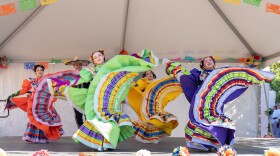This year marks the 100th anniversary of the ratification of the 19th Amendment, granting women the right to vote. The Seattle Pro Musica choir is marking the centennial in an upcoming concert that features songs entirely by American women composers. The concert, "Shall Not Be Denied," takes place March 7-8, the weekend of International Women’s Day.
Attendees may notice there aren't any songs about revolution and securing the right to vote. That was a conscious choice made by the choir. Its artistic director and conductor, Karen P. Thomas, said the songs highlight the diversity of women as artists instead.
"One hundred years, it's not just the vote that women got. It's everything else that women now are doing that they didn't do 100 years ago in any field, in any endeavor. In the arts, recognizing it as women are composing and they have been," Thomas said.
Thomas has been involved with the choir since 1987 and received the Mayor's Arts Award in 2018. She was recognized for her efforts to make Pro Musica — and choirs across the United States — welcoming and safe places for members of the LGBTQ community, and specifically transgender and gender nonbinary singers. Seattle Pro Musica's full choir is mixed-gender and has 80 members.
The representation of LGBTQ artists also extends to the concert's repertoire. The choir is perfoming a piece by transgender and Latina composer, Mari Esabel Valverde, titled "Still wie die Nacht." The choir's program describes the piece as a "lushly chromatic setting" of a romantic 19th century poem. The song is a favorite of Nancy Haver, who sings alto in the choir.
"When I think of the amendment and I think of the rights that came with that, the opportunity for this woman. Here's this woman who has selected this poem, out of her own strength of standing up for exactly who she is," Haver said.
Diversity is seen not just in the identities of the composers, but also in the themes within their compositions. These include beauty, peace and freedom. The spirit of exploration is celebrated in “Astronaut Anthem” by Meredith Monk, which brings to mind the beeping of starships and satellites as they navigate space and transmit information back to Earth.
The piece that opens both concerts is called “Sorida” by Rosephanye Powell. “Sorida” is a term of greeting in the Shona language of Zimbabwe, Africa, similar to “shalom” in Hebrew or “jambo” in Swahili, according to the concert’s program notes. The song “Tuttarana” by Indian-American composer Reena Esmail combines the Italian word “tutti,” meaning all or everyone, and the term “tarana” that describes a specific North Indian musical form that is most closely comparable in Western musical terms to scatting in jazz.
Although Seattle Pro Musica's concert won't have any songs that specifically address the fight for the right to vote, Thomas says the concert still speaks to the struggle for representation and freedom. Those battles are evident in one song in particular called "Her Beacon-Hand Beckons," composed by Caroline Shaw.
“It’s kind of a riff on the poem ‘The New Colossus’ that’s on the Statue of Liberty. But it’s a change in the text and it highlights this mixture of feelings about America as a welcoming place for immigrants — like it should be, and it is, and yet in our present environment there are so many struggles around that.” Thomas said. “And I think the piece delivers that message in a really artistic and beautiful way.”
The fight for women's rights, and the right to vote, continued long after the 19th Amendment was adopted, as seen in the passage of the Voting Rights Act of 1965 that put an end to discriminatory voting practices. Voting-rights advocates continue pushing for reform today and addressing new barriers, such as voter ID laws, which activists say disproportionately affect people of color at the polls. There’s also an ongoing push to restore voting rights to formerly incarcerated people and people in prison.
Seattle Pro Musica’s concert comes not long after a bill that would have automatically restored voting rights to people convicted of felonies upon their release from prison died abruptly in the state Legislature. The bill also aimed to end provisional voting rights, which remove a person’s right to vote if they violate the terms of their probation. Under current state law, people with felonies have their voting rights restored after they complete community custody — meaning they are out of prison but still being supervised by the Department of Corrections.
The timing of the concert also coincides with the weekend of International Women’s Day, on March 8. The choir is marking the date by hosting “Prime Voci” from the Seattle Girls Choir, which will open the concert with a set of empowering songs by female composers. The March 8 concert also will be preceded by a conversation moderated by The Seattle Times' social justice columnist Naomi Ishisaka, on the history of the 19th Amendment and voter’s rights.
For the members of Pro Musica, music and especially choral music is the perfect tool to translate the ideas embodied by the adoption of the 19th Amendment.
“I always say it’s all about the text,” said Marilyn Colyar, who sings soprano in the choir. “There’s something to be said, there is a message to be given, there is beauty to be shaped by words as well as music.”
Seattle Pro Musica marks the centennial of the ratification of the 19th Amendment with "Shall Not Be Denied" the weekend of International Women's Day. Performances take place on Saturday, March 7, at Trinity Lutheran Church in Lynnwood and on Sunday, March 8, at Seattle First Baptist Church.








